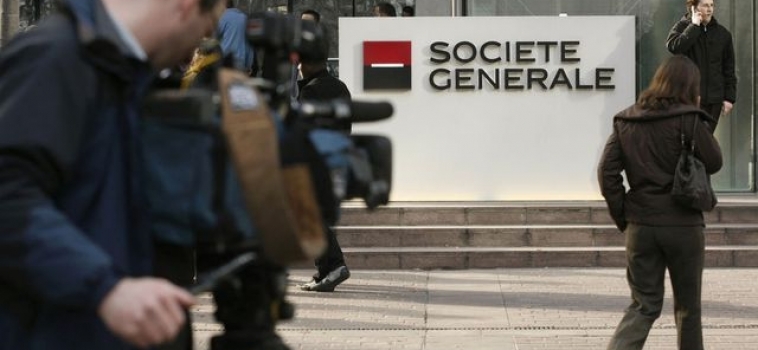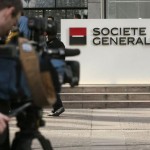[ à lire cet article en français cliquez ici ]
Reported by: Darius Champion, special correspondent to Project Counsel and Gregory P. Bufithis, founder and chairman of Project Counsel
6 October 2010 –Former Société Générale trader Jérome Kerviel was found guilty of breach of trust, computer abuse and forgery by a Paris court on Tuesday for his role in a trading scandal that cost the bank close to €5bn ($7bn).
Kerviel was sentenced to five years in prison, including two years suspended, for his role in the trading scandal. A Paris court also ordered 33-year-old Kerviel to reimburse the French bank €4.9bn lost in unauthorized trades which brought SocGen to the brink of collapse in 2008. All this for a man who didn’t make a penny. What is Bernie Madoff thinking?
Kerviel’s lawyer said he would appeal against the “unreasonable” judgment which he described as “totally excessive”. Kerviel remains at liberty pending the appeal (which may take 18 months to get back into court). He was banned from participating in any trading activity.
The judges said that Kerviel had not been given even tacit authorization from his bosses to speculate excessively and that SocGen’s own shortcomings did not exonerate him from his duties as a professional trader.
The judges also said Kerviel knew exactly what he was doing in overstepping his remit as a trader and that he sought to hide his trading positions. “Kerviel knowingly went beyond his remit as a trader,” presiding judge Dominique Pauthe told the court.
The case had a multitude of e-discovery and compliance issues. For our full previous coverage click here for English and click here for the French version.
The verdict will not have much affect on SocGen, which has admitted “weaknesses” in its internal controls and was given a record fine by the banking regulator and has since spent €130m strengthening its controls. In the US last week a long-standing class-action suit against SocGen was dismissed, following the precedent set by the recent Morrison v. Nab case this year (for a summary of that case click here).
And French investors would not have much of a case, either. It would be difficult for French investors to seek damages from SocGen because of the difficulty of proving a direct link between the Kerviel affair and the fall in value of SocGen shares. So, most investors appear to have put the scandal behind them.
For Kerviel, the €4.9bn fine is a little illusory as it makes little difference whether one drowns in 10 feet of water or two miles. But it leaves him bankrupt and that, plus the criminal sentence, sends a stern message. And that seems to be the point of the verdict: to send a message. The case highlights the asymmetry of power between a financial system that can cast itself as victim and investors who are probably as much victim but have no means of organizing themselves. The trial certainly highlights the need for class actions lawsuits in France.
Interesting point: Well, maybe he will not be totally bankrupt. According to a report in Le Monde, SocGen will not ask Kerviel to give up his salary, savings or assets. But the bank will seek any revenue “derived from the fraud” which would include the money Kerviel made on his book L’engrenage, Mémoires d’un trader(“Trapped: Memories of a Trader”) which chronicles the affair. His publisher is estimated to have sold 50,000 copies at €20 apiece (approximately €1 million or $1.38 million).
Most commentators on the case, and people we spoke with in the courtroom, expressed surprise that the bank escaped blame in the trial. It had admitted to “serious failings” in its controls. But it is rather surprising that notwithstanding substantial evidence presented to the contrary, SocGen was absolved of all responsibility and the blame, in its entirety, was placed on the shoulders of one low-level bank employee.
SocGen denied the ex-trader’s allegations that his superiors knew what he was doing but turned a blind eye while he was making money. It admitted lax controls while it focused on building up its investment banking business into a derivatives powerhouse.
So, someone enters trades equal to the entire net worth of the bank and no one knew about it? The culpable were laughing into their champagne last evening. One can only be reminded of the Dreyfuss case or Kubrick’s “Path’s of Glory” where the conviction of an individual is used to shield or vindicate the more powerful above him. Kerviel is clearly guilty of fraud and forgery. But one trader managed to subvert the bank’s entire computer system, managed to gain access to such enormous resources from others without authority, without anyone noticing? Obviously, if his trades proved profitable, the bank would have kept the gains and rewarded him. But since he lost, he is a thief.
Darius and I were both currency traders before becoming lawyers. As we had stated in our earlier report we believe that direct management at SocGen were in-the-know about many of his unhedged positions given his position on the Delta One desk, his treasury reports, etc. Kerviel’s trading profits were extraordinarily high and would have indicated that he was dealing outside his official remit and would have been detected. Even the SocGen witnesses testified that several databases would have been available to Kerviel’s superiors where all trading operations could be tracked. (For more details on what Kerviel did and the details of his trading you can read our earlier report linked above).
It boils down to the old game of “wink-wink-nudge-nudge”, of eyes wide shut. Financial institutions of all types are notorious for weakening risk-management procedures when times are good and profits are flowing fast. There is an executive game at play: balancing the potential gains from a risky endeavor versus the potential losses. Taking advantage of opportunities vis-à-vis risk management. The whole governance-risk-compliance game taken at a slightly different angle.
And let’s put it in perspective: Kerviel and the imaginary gains of Bernard Madoff and other swindlers may come close to a $100bn loss, but the cost of foolishly made (legal) loans and transactions will surpass $2,200bn in losses, according to the IMF.

